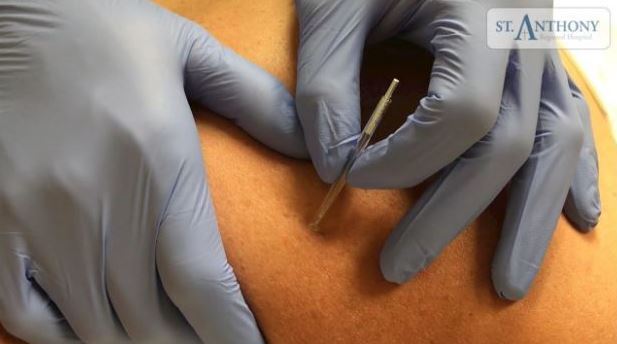Functional dry needling (FDN) is a therapeutic treatment procedure that utilizes thin, solid filament needles to deactivate and desensitize trigger points in muscles. Myofascial trigger points are knots in muscles that can contribute to pain, decreased flexibility and decreased muscle function. There is no solution injected and the needle used is very thin.
What to expect with a typical FDN treatment?
Most patients will not even feel the needle penetrate the skin, but once it advances into the muscle the discomfort can vary from patient to patient.
Usually a healthy muscle feels very little discomfort upon insertion of the needle; however if the muscle is sensitive and shortened or contains active trigger points, the subject may feel a sensation much like a muscle cramp, often referred to as a twitch response. FDN may reproduce symptoms directly in the muscle being treated or may refer to other areas of the body. This is a form of referred pain, which is one of the hallmarks of trigger points.
How does FDN work?
FDN is a treatment for muscular tightness and spasms, which commonly follows injuries and often accompanies degenerative processes or a chronically painful condition. Muscular tightness and spasms cause compression and irritation of the nerves exiting the spine. When the nerves are irritated, they cause a protective spasm of all the muscles to which they are connected. This may cause peripheral diagnoses such as tendinitis, osteoarthritis, decreased mobility and chronic pain. Small, fine needles are inserted in the muscles at the trigger points causing the pain referral. The muscles then reflexively contract and then release, improving the flexibility of the muscle and decreasing symptoms. Functional dry needling treats these trigger points to release them and allow the muscle to heal.
Conditions treated with FDN:
- Back pain and sciatica
- Neck pain
- Tennis elbow
- Shoulder or rotator cuff tendinitis
- Headaches
- Achilles tendinitis
- Plantar Fasciitis
- Hip pain
- Myofascial pain syndromes
Doctors referrals are not needed for this treatment and is covered by most insurance plans.
Contact St. Anthony Rehabilitation Department at (712) 794-5000 or you may email questions by clicking HERE.